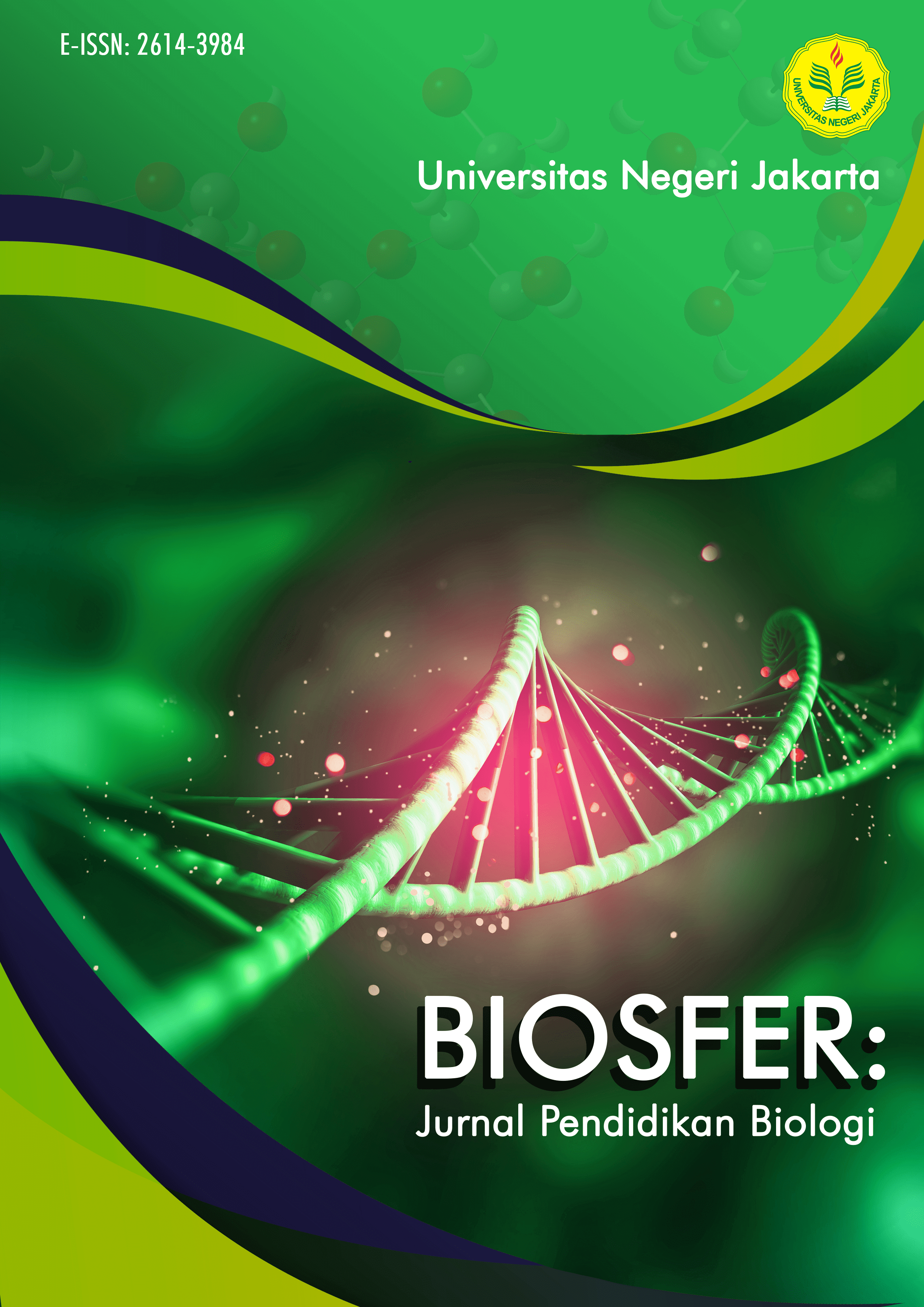The relationship between knowledge of socio scientific issue and nature of science in ecosystem material in high school students
DOI:
https://doi.org/10.21009/biosferjpb.19531Keywords:
Correlation, Nature of science, Socio scientific issueAbstract
The purpose of this study was to know the relationship between socio-scientific issues with nature of science students in ecosystem material of the XI Math and science class in one of the High Schools. This research was conducted from September- October 2020. The type of research was correlational with sample of 36 students taken using a purposive sampling technique as evidenced by the average value of daily tests. The technique on data collection was a non-test instrument socio-scientific issue questionnaire and essay test the nature of science. The research instruments used included a socio-scientific issue questionnaire which states 13 statements regarding controversial issues regarding ecosystems and the views nature of science form B (VNOS-B) description test to measure the nature of science dictated by Lederman et al. (1998) and have settled 14 questions. Data were analyzed using Pearson bivariate. The results of this study obtained a significance of 0.00 < (0.05) which indicates the relationship between socio-scientific issues with the nature of science and 0.729 as the display value. This analysis concludes that there is a positive relationship between socio-scientific issues with the nature of science at a high level. Teachers are expected to be able to improve skills in indicators of socio-scientific issues, one of which is by training sensitivity and awareness of environmental problems that students encounter on a daily basis.
References
Beglar, D., and Nemoto, T. (2014). Developing Likert-scale questionnaires. JALT2013 Conference Proceedings, 1–8.
Hacieminoglu, E. (2014). In-service Teachers’ Perceptions Regarding their Practices Related to Integrating Nature of Science: Case Study. Procedia - Social and Behavioral Sciences, 116(1988), 1268–1273. https://doi.org/10.1016/j.sbspro.2014.01.381
Hacıeminoğlu, E., Ertepınar, H., Yılmaz-Tüzün, Ö., and Çakır, H. (2015). Students and school characteristics related to elementary school students’ views of the nature of science. Education 3-13, 43(6), 700–721. https://doi.org/10.1080/03004279.2013.865655
Karisan, D., & Zeidler, D. L. (2017). Contextualization of Nature of Science Within the Socioscientific Issues Framework: A Review of Research. International Journal of Education in Mathematics, Science and Technology, November, 139–152.https://doi.org/ 10.18404/ijemst.270186
Khishfe, R. (2012). Nature of Science and Decision-Making. International Journal of Science Education, 34(1), 67–100. https://doi.org/10.1080/09500693.2011.559490
Khishfe, R., & Lederman, N. (2006). Teaching nature of science within a controversial topic: Integrated versus nonintegrated. Journal of Research in Science Teaching, 43(4), 395–418. https://doi.org/10.1002/tea.20137
Lederman, N. G., Abd-El-Khalick, F., Bell, R. L., and Schwartz, R. S. (2002). Views of Nature of Science Questionnaire: Toward Valid and Meaningful Assessment of Learners’ Conceptions of Nature of Science. Journal of Research in Science Teaching, 39(6), 497–521. https://doi.org/10.1002/tea.10034
Liang, L. L., Chen, S., Chen, X., Kaya, O. N., Adams, A. D., Macklin, M., and Ebenezer, J. (2008). Assessing preservice elementary teachers’ views on the nature of scientific knowledge: A dual-response instrument. Asia-Pacific Forum on Science Learning and Teaching, 9(1), 1–20.
Listiani, & Kusuma, A. E. (2017). View of Nature of Science (VNOS) Form B: An Instrument for Knowing the Understanding of the Concept of Science Nature of Teacher Candidates at the University of Borneo Tarakan. Jurnal Pendidikan Biologi Indoneisa, 3(1), 45–54. (in Indonesia)
Sadler, T. D., Chambers, F. W., and Zeidler, D. L. (2004). Student conceptualizations of the nature of science in response to a socioscientific issue. International Journal of Science Education, 26(4), 387–409. https://doi.org/10.1080/0950069032000119456
Subiantoro, A. W., Ariyanti, N. A.,& Sulistyo. (2013). Pembelajaran materi ekosistem dengan socio-scientific issues dan pengaruhnya terhadap reflective judgment siswa. Jurnal Pendidikan IPA Indonesia, 2(1), 41–47. https://journal.unnes.ac.id/nju/index.php/jpii/article/view/2508
Sumfleth, E., & Jorde, D. (2001). Research in Science Education - Past, Present, and Future. Research in Science Education - Past, Present, and Future, June 2014. https://doi.org/10.1007/0-306-47639-8
Sumranwanich, W., & Yuenyong, C. (2014). Graduate Students’ Concepts of Nature of Science (NOS) and Attitudes toward Teaching NOS. Procedia - Social and Behavioral Sciences, 116, 2443–2452. https://doi.org/10.1016/j.sbspro.2014.01.589
Wang, H. H., Hong, Z. R., Liu, S. C., & Lin, H. S. (2018). The impact of socio-scientific issue discussions on student environmentalism. Eurasia Journal of Mathematics, Science and Technology Education, 14(12). https://doi.org/10.29333/ejmste/95134
Zeidler, D. L., & Nichols, B. H. (2009). Socioscientific issues: Theory and practice. Journal of Elementary Science Education, 21(2), 49–58. https://doi.org/10.1007/bf03173684
Zeidler, D. L., Walker, K. A., Ackett, W. A., and Simmons, M. L. (2002). angled up in views: Beliefs in the nature of science and responses to socioscientific dilemmas. Science Education, 86(3), 343–367. https://doi.org/10.1002/sce.10025
Downloads
Published
How to Cite
Issue
Section
License
The Authors submitting a manuscript do so on the understanding that if accepted for publication, copyright of the article shall be assigned to Biosfer: Jurnal Pendidikan Biologi (Biosferjpb) and Departement of Biology Education, Universitas Negeri Jakarta as publisher of the journal.



